 One of the things I like about games and books is their unlimited possibilities; the stories we can create in both of those mediums are limited only by our imagination, especially when video games trade fancy visuals for text-based gameplay. Failbetter Games’ Fallen London is one of my favorite games precisely for its imaginative and expansive world whose variety I find highly entertaining. Voyageur ($3.99), a piece of “interactive science fiction literature" as its developers call it, is inspired in many ways by Fallen London (Free), and that should come as no surprise since the game was produced in partnership with Failbetter Games. While in Fallen London you explore the streets and stories of an alternate Victorian-era London, in Voyageur you begin a one-way trip towards the center of the galaxy. Since this is a one-way trip, the game adds a roguelike layer to your typical interactive fiction experience, which attempts – thought not that successfully – to promote repeated playthroughs. Is the journey worth it, then? Read on and find out.
One of the things I like about games and books is their unlimited possibilities; the stories we can create in both of those mediums are limited only by our imagination, especially when video games trade fancy visuals for text-based gameplay. Failbetter Games’ Fallen London is one of my favorite games precisely for its imaginative and expansive world whose variety I find highly entertaining. Voyageur ($3.99), a piece of “interactive science fiction literature" as its developers call it, is inspired in many ways by Fallen London (Free), and that should come as no surprise since the game was produced in partnership with Failbetter Games. While in Fallen London you explore the streets and stories of an alternate Victorian-era London, in Voyageur you begin a one-way trip towards the center of the galaxy. Since this is a one-way trip, the game adds a roguelike layer to your typical interactive fiction experience, which attempts – thought not that successfully – to promote repeated playthroughs. Is the journey worth it, then? Read on and find out.
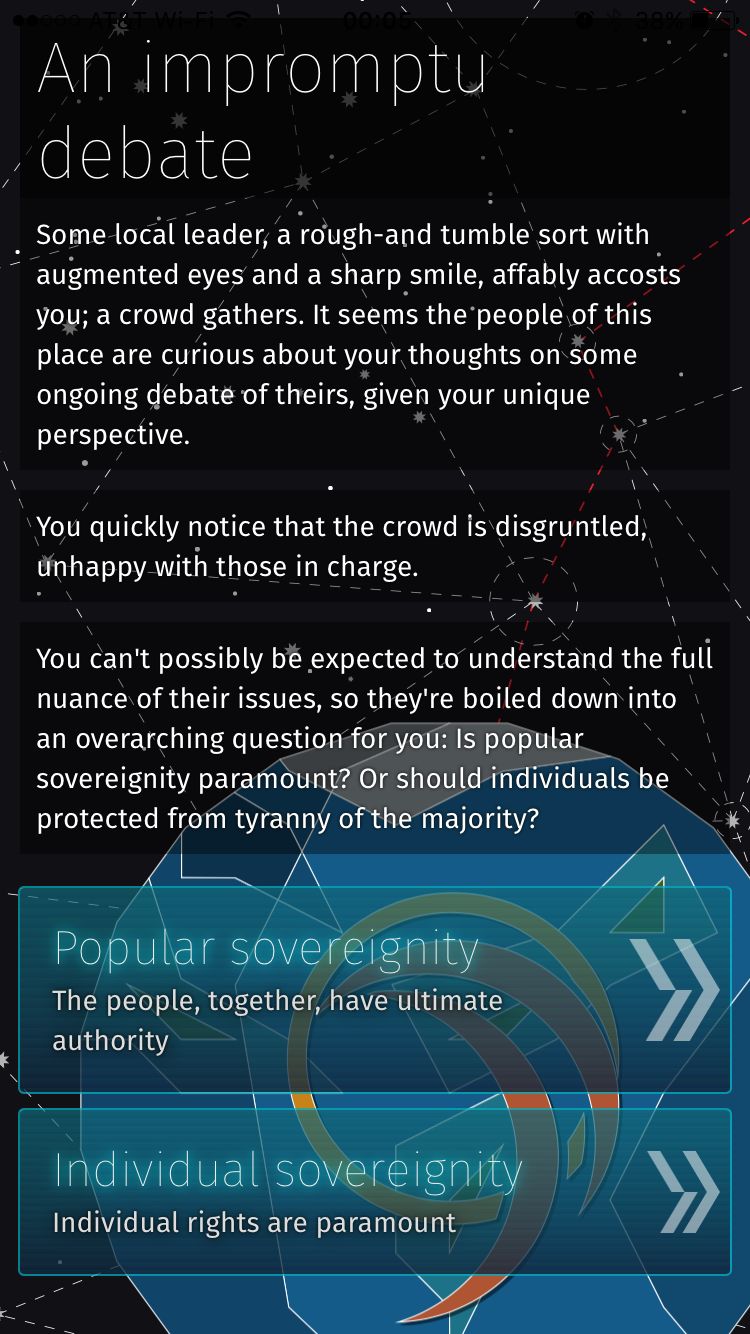
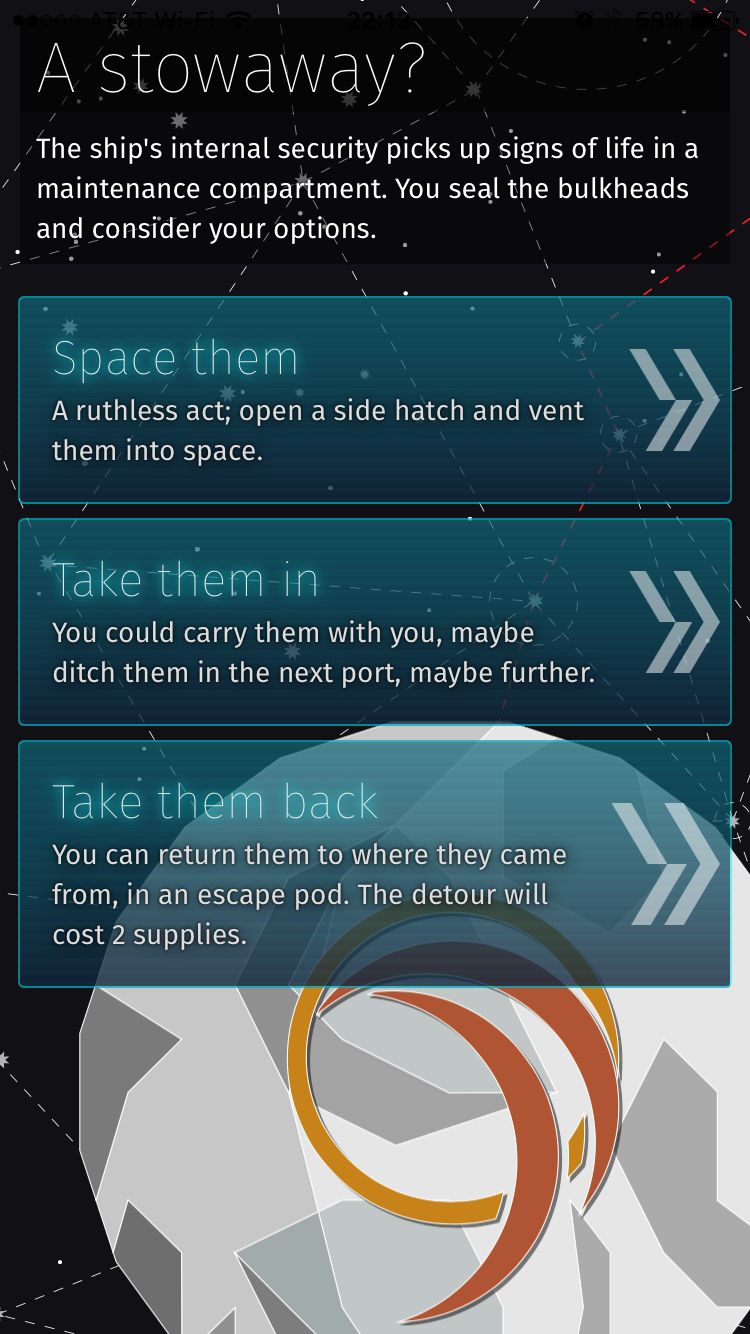
Voyageur‘s main gameplay loop is traveling to a planet, loading up on supplies – so you can then travel to another planet – buy and sell all kinds of weird stuff at the market, and experience whatever the specific planet has to offer. These experiences come in the form of random encounters with smugglers, resistance fighters – there’s a light Star Wars-like vibe to the game’s politics – possible crew members or random travelers, and so on. You can also visit various locations like museums for instance or even go on expeditions. The basic loop becomes quite predictable after the first 15 or so planets; you’ll be buying various goods on one planet and then offloading them when you get a better deal a couple of planets later, buying sufficient supplies almost mechanically, and then picking a planet to visit from the list of 2 or 3 you get each time.
After a while, the planets start sounding the same – even their descriptions are almost identical to earlier ones – and while there is an overarching narrative that ties the universe together, Voyageur doesn’t ground your experience as much as it could have. The result is my eyes glazed over the planet descriptions quite often towards the latter stages of my voyages because I had visited similar planets in the past too often to feel surprised or intrigued. There are a ton of planets to visit, but more than once I felt I would have preferred fewer planets but ones that felt more distinct and more intriguing.
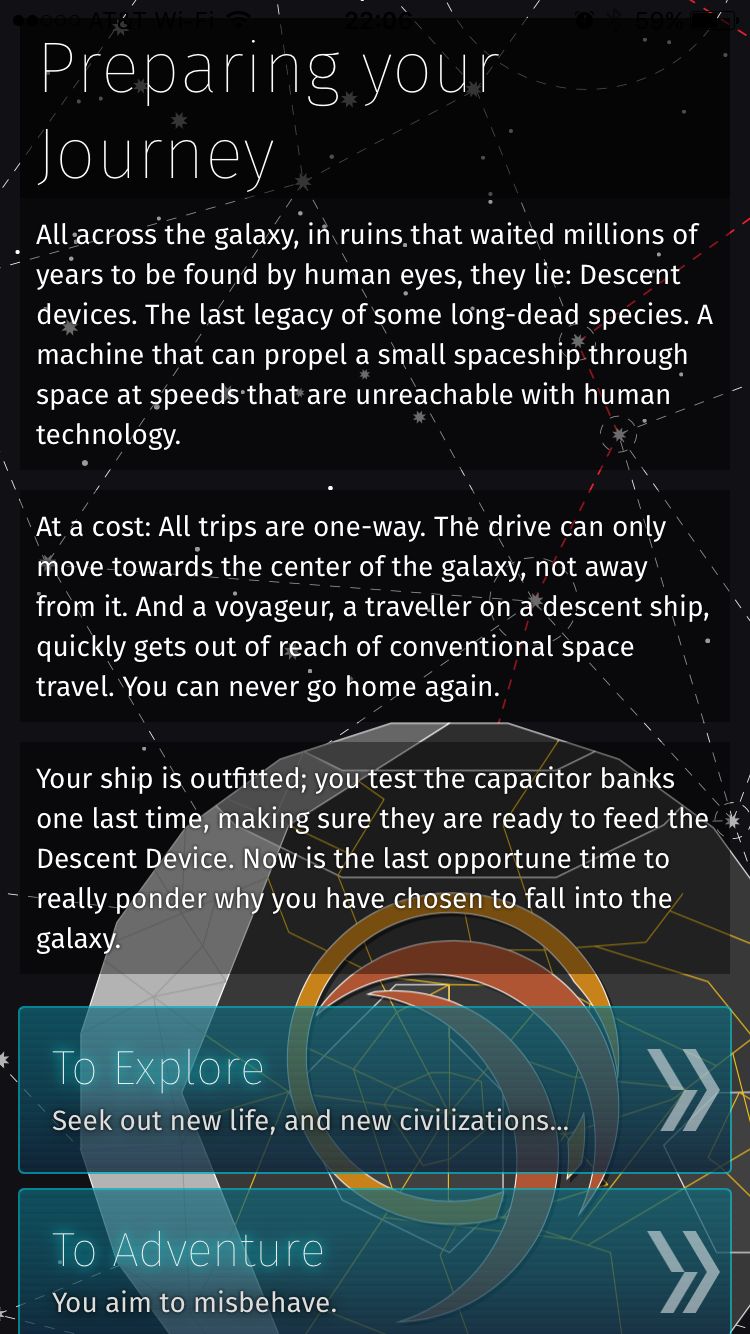
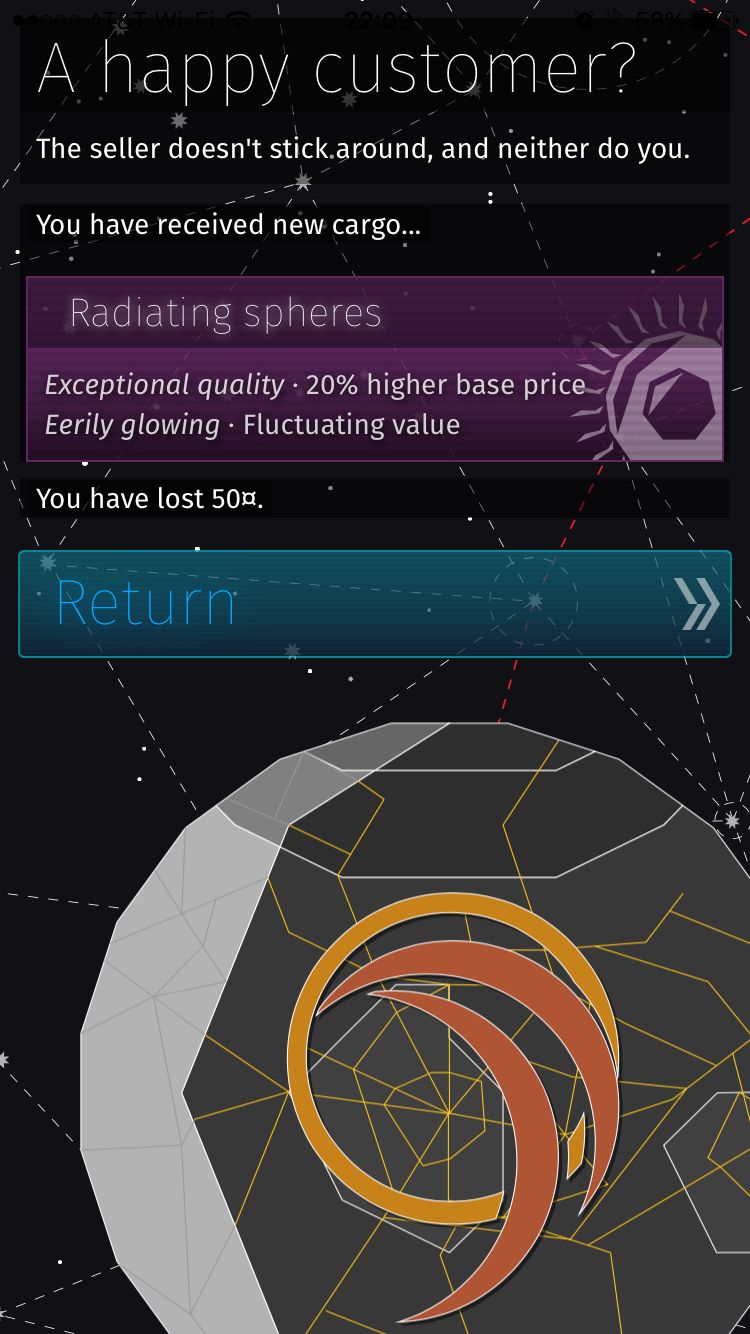
Don’t get me wrong; there’s a lot to do in the game given that the world and story are procedurally generated. However, as games like No Man’s Sky have shown recently, procedural generation might offer quantity but doesn’t always offer quality. Since the text in Voyageur is procedurally generated – recombined parts of authored text – I find myself re-reading passages I’ve read before, and that feeling of familiarity clashed with the sense of discovery I expected from a one-way ticket to the center of the galaxy. I understand the reasons behind the decision to go with procedural generation when you are a small studio, but perhaps the game would have been better served with shorter playthroughs to help avoid the repetition.
Speaking of playthroughs, the game has a handful of different endings, and every time you “end" one playthrough, you start over again fortified with some of your previous experiences. I won’t spoil how the endings come about because discovering them is entertaining, but I will say that they take a while to encounter, which made me less interested in going back and starting all over again. The gameplay loop was a bit too similar for me to invest more time to it.
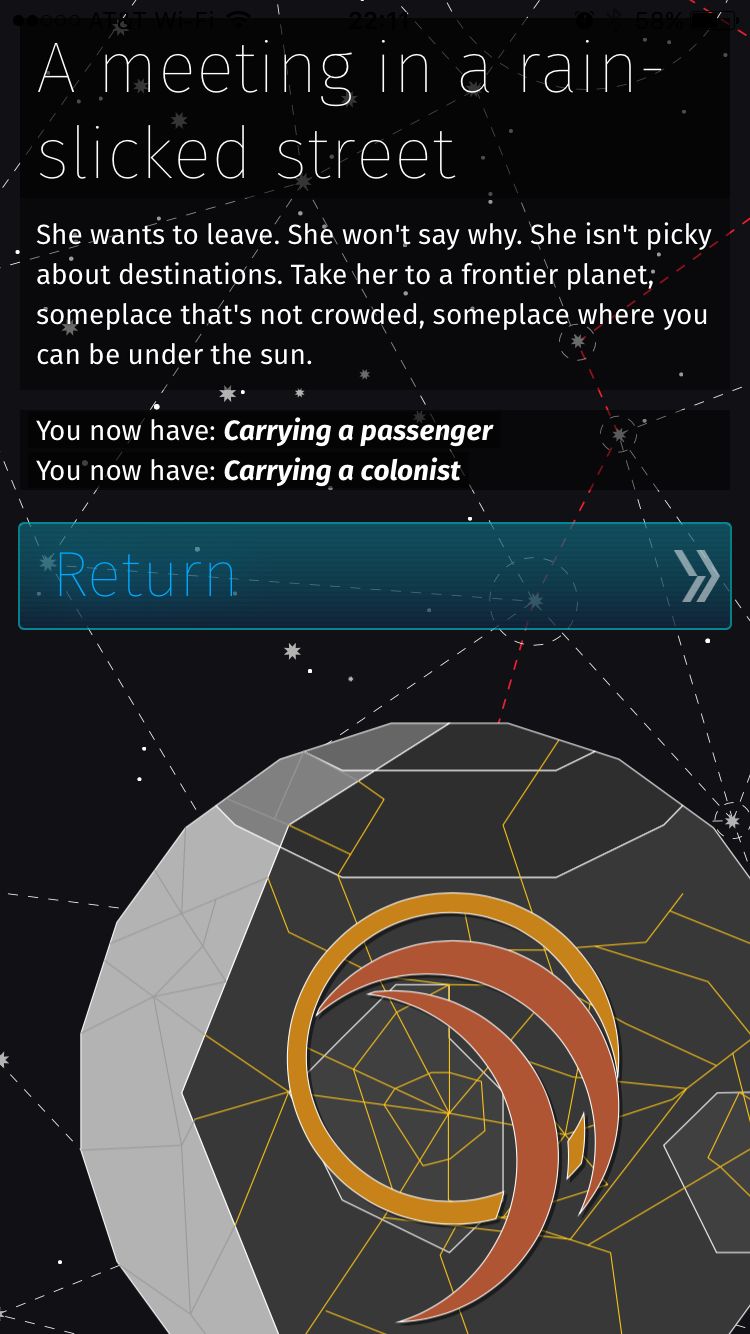
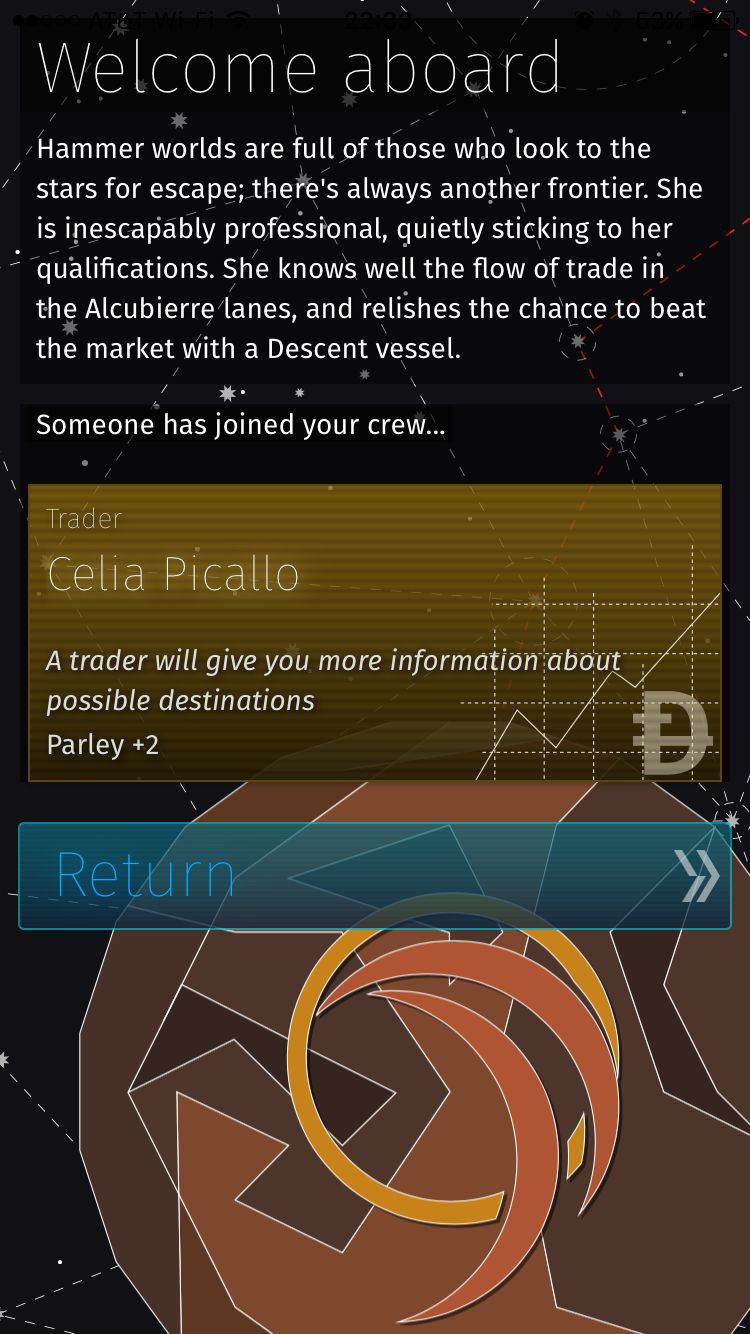
Despite my issues with the procedural generation part of Voyageur, players who like text-heavy games will find plenty of fun moments. As you travel across the galaxy, you gain knowledge that you can then share with others – usually for a profit. There’s also the resistance story to get involved in, and that’s quite fun initially, and a constant debate over political systems and the role of the individual in governance. All these are fun storylines, although, again, they do start feeling too similar later on. You’ll also often find stowaways that you’ll have to deal with or passengers that want a ride. So there’s plenty of fun moments to experience in Voyageur; you’ll just be experiencing them regularly.
You can also assemble a crew to help you with your travels, and each of them has a semblance of a personality. They’ll even get mad at you and even revolt if you’re doing one of the few things they hate. I wish, though, that they were more fleshed out because their cardboard-deep personality kept me from getting invested in their fates or reasoning; if one of them decided to flee, I really didn’t care much and I just went and found a replacement.
Visually, the game is as sparse as it gets, which is unsurprising in a piece of interactive fiction. The soundtrack is better than the visuals in terms of variety, and it does a nice job of keeping you company across your travels. The good thing is that the game plays fine on an iPhone despite the tons of text you have to read on the small screen.
Overall, Voyageur is an ambitious attempt at a procedurally generated sci-fi interactive fiction whose lengthy playthroughs end up hurting it rather than helping it. There’s plenty to explore and plenty to do, so it’s worth at least one trip down the galaxy; unfortunately, you might not feel like going through it again after it’s done.